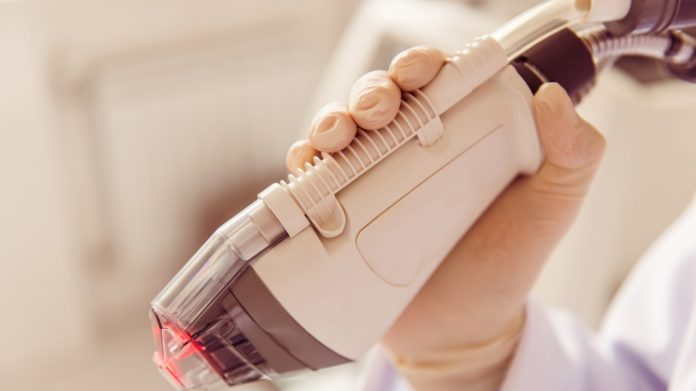Global technology leader Laird has designed and manufactured thermoelectric modules (TEMs) and thermoelectric assemblies (TEAs) that keep laser optics stable and at peak operating performance by controlling the operating temperature of the medical laser to within defined parameters. Excess waste heat generated from the laser head is removed by offering precise cooling below ambient via convection or conduction. The compact thermoelectric modules and assemblies provide reliable solid-state operation with no vibration to ensure long life operation with low maintenance requirements resulting in lower total cost of ownership in medical laser applications.
Medical lasers are designed for use in hospitals, outpatient surgical centers, and physician offices. They combine cutting, ablation, and coagulation properties for precise, virtually bloodless procedures; minimizing thermal damage to the surrounding tissue and increasing recovery time. They also sanitize the area through the heat of the laser, destroying any microbiological bodies that could lead to infection. Although medical lasers are valuable to many medical treatment applications, they do generate waste heat that affects the lasers performance when in operation. They also have size constraints, power consumption requirements, and noise restrictions that make thermal management difficult.
TEMs offer precise temperature control accuracy achieving ±0.01 degree C under steady-state conditions. They can cool to -100 degree C (6-stage) and pump up to 15 watts per square centimeter of heat, with higher heat pumping capacities achieved by wiring TEMs into an array. Commonly used in medical laser applications, the Laird CP Series can pump between 3 and 120 watts of heat. Available in numerous heat pumping capacities, geometric shapes, and input power ranges, the CP Series modules are designed for higher current and larger heat pumping applications with a maximum operating temperature of 80 degree C. Fitting into tight geometric space constraints, TEMs can be mounted in any orientation that cannot accommodate a much larger compressor-based system.
Laird offers the widest selection of TEAs on the market. Thermoelectric assemblies utilize thermoelectric modules to transfer heat by air or conduction methods that include integrated temperature controls. Offered in air-to-air and direct-to-air versions, the Tunnel Series (up to 40W) and PowerCool Series (up to 195W) remove the passive heat load generated by the ambient environment in order to stabilize the temperature of sensitive components used in medical lasers. The liquid-to-air Liquid Series (up to 160W) offers dependable, compact performance by cooling objects via liquid to transfer heat.
All of Laird’s thermoelectric modules are designed to achieve a high coefficient of performance (COP) to minimize power consumption.
“Thermal management of medical laser components and systems is now more challenging than ever. Power densities continue to increase while product form factors continue to shrink. Simple thermal management solutions, such as adding a fan or heat sink, are no longer typically viable to meet required performance and reliability specifications. In today’s complex medical operating environment, TEMs and TEAs are necessary to provide precision cooling and heating in a variety of modular platforms,” said Anders Kottenauer, Senior Vice President of Laird’s Engineered Thermal Systems Business.
More information on Laird’s TEMs and TEAs for medical laser systems can be found by visiting https://www.lairdtech.com/solutions/thermal-management

